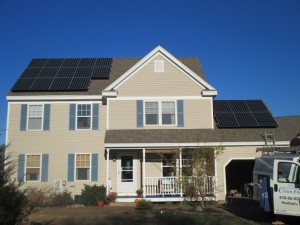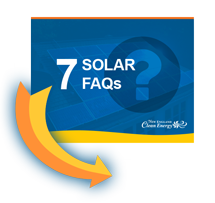Solar Financials FAQs
Q: How much do solar panels cost?
A: There is no cookie-cutter direct answer to how much do solar panels cost. The price of residential solar electric systems varies based on system size, panel choice, and many other possible variables. To “ball park it” though, Systems can cost anywhere between $10,000 and $50,000 before investment tax credits and other incentives. But it really depends on how you look at it. After all, electricity is a fixed part of your monthly budget. What if buying solar reduced your electricity bill enough to pay for your monthly loan payment? Then at the end of say 10 years you enjoy close to no electricity cost at all? Is that really costing you more money – or just changing how you’re spending the money you’re already doling out? That said, we do know the number looks scary so it is important to point out that there is a 30 % federal tax credit and you may also qualify for other state or municipal incentives. Each of them can lop off a huge piece of the purchase price.
Q: How do I pay for my solar panels?
A: Some folks can of course pay cash, but if that’s not going to work for you we can help you sign up for a solar loan to finance your system. And while yes, you can definitely go get a home improvement or similar loan from your bank the specific solar loan options we have can be very attractive. Not just for a decent interest rate, but many of the other aspects of the loan are attractive as well. Regardless of your situation, we’ll help you understand your options, make the application, and pretty much make getting a loan (and solar) a turnkey process.
Q: Do you offer a solar lease?
A: Yes. Leases tend to work best for people who pay little to no income tax So for example, leases are great options for non-profit business customers. But that said, it is very rare indeed that a residential customer would do better with a lease than cash or a loan. It is something we are happy to elaborate on if you still have questions.
Q: Are there any other costs of going solar?
A: The price we quote you covers all aspects of designing and installing your solar system. However, if your main breaker panel is not large enough to accommodate the addition of solar or if the wiring is old, you may need to have your wiring updated. Additionally, if your roof has less than 10 years of life left, we recommend replacing it before you have the solar electric system installed. Because a solar system will be in place for more than 25 years, it is best to start with a roof that has plenty of life left. Note that in some cases you may be able to include the cost of re-doing the roof under your array in your federal investment tax credit claim – but you’ll have to check with your tax advisor to be sure.
Q: Why can’t you give me an instant quote for how much do solar panels cost like a lot of the other solar companies?
A: Well, technically, we can, but we generally don’t. Our solar systems are custom-designed, not cookie-cutter, based on your actual roof and rafters, not a grainy online image. We prefer to put together proposals that are as water-tight as possible, and based on accurate data (your electricity usage, roof size, roof azimuth and pitch, shade readings, etc.). Then you can have faith in the estimated savings, income and payback time frame outlined in your proposal. We just don’t think it is fair to give you a number only to change it after you’ve made a commitment to a “sight unseen” estimate. We want to give you complete and honest answers.
Q: What are the “incentives” for going solar?
A: Residents in all states are eligible for a 30% federal tax credit. Beyond that federal benefit, there are programs at the state and even at some municipal levels. (Example include New Hampshire’s full net metering credits, the Massachusetts SMART program, or Rhode Island’s REG and REF initiatives. In each case we will walk you through the list of incentives that apply and include them in your personalized proposal. That includes a financial model of how your costs should play out over the next 25 years. As noted in our answer to the first question above, most folks will simply be shifting money from one expense (the utility) to another and the difference will be how quickly they’ll “be in the money” with their solar investment.
Q: How long does it take homeowners to pay off the investment in their solar electric system?
A: Most homeowners recover their entire solar investment in 8-15 years, compared to 20+ years just a few years ago. And keep in mind that few other home improvements pay for themselves at all. For example, central air conditioning costs you money to install and then costs you more money to run.
Q: How does my solar electric system pay for itself?
A: Solar pays for itself through (1) the money you save on electricity; (2) the credit you get on your federal income taxes; (3) and “performance-based income” you generate from state and local incentive program payments.
Q: What can I expect as a return on investment (ROI) for my solar energy system?
A: The intangible returns are priceless – the satisfaction on your kids’ faces when they tell their friends you’re making clean power; the feel-good factor of opening your first negative-balance electric bill; or the giggles you get the first time you see your electric meter “spin backward”. But there is also a very real dollar and cents part of the equation. A typical 6-kW system provides a whopping 200% 20-year Return On Investment (ROI). Compare that to most other home improvements and the difference is clear. Solar will even improve your home’s resale value.
Q: How much money can I save on my electric bill by installing solar panels?
A: System size, your roof, and your electricity usage factor into how much you save, but it can easily be hundreds or even thousands of dollars a year. We will give you an estimate for your particular situation in your proposal. Remember, if your primary goal is to save money, be sure to also investigate ways to use less electricity in your home through energy efficiency measures.
Q: What are SRECs (Solar Renewable Energy Certificates)?
A: SRECs (pronounced S-Reks) formed the basis of the SREC and then SREC II programs. The second program, SREC II was available to join in Massachusetts through November 2018. Those that got into the program will enjoy its benefits for 10 years. Since then, SRECs have been replaced in Massachusetts by the state’s new Solar Massachusetts Renewable Target (SMART) program explained below.
Q: What is SMART (Solar Massachusetts Renewable Target)?
A: Like the programs that came before – the Commonwealth Solar rebate and SREC/SREC II programs – the SMART program was designed to encourage the installation of more solar. We believe the SMART program is easier to understand and easier to participate in than the programs that came before it. It also provides guaranteed money every month. Plus, what you get will be known and fixed once you’re in the program (which requires a signed agreement to file and lock in an application). That said, the exact amount you will get varies by your utility, your system size, your type of solar installation, and most importantly timing. In short, the sooner you move ahead the more SMART money you will get. You can see some of the complexity behind it on this page of the state SMART website, but you can also make it easy on yourself and call us. We’ll do the calculation for you! Or, start by reading more on our blog here.
Q: What are REG payments?
A: The REG or Renewable Energy Growth program is in Rhode Island. Launched in the summer of 2015the program pays you for the solar you produce, at a much higher rate than the normal price of electricity (directly through the utility, National Grid). We will explain how this works in detail when we prepare a proposal for you, and of course help with the paperwork. But just like most other programs, the longer you delay the lower your returns so please don’t delay in contacting us.
Q: What is the REF program?
A: Rhode Island offers another option to the REG called the REF or: Renewable Energy Fund grant. In essence, this program – the REF – is an upfront grant, while the REG in the question above is a regular payment based on your system’s production. Yes, we KNOW this is confusing. Worse still, neither program runs continuously throughout the year. But they do open (and close) in a predictable fashion and we explain the requirements and timing for each of them. But most importantly, as noted above, the amount of funds you can get depends greatly on your timing. Put simply, the sooner you get into one of the programs the more financial support you can get. Contact us and we will explain how this works in detail, including timing and all your options.
 “I had New England Clean Energy install my solar panels. I found them to be excellent in informing me what was going on, what was about to go on and when I could expect things to happen. They were always friendly and professional. They cleaned every bit of debris off the lawn, my stairs and on my floors. They were all happy to meet my dogs. I highly recommend them.”
“I had New England Clean Energy install my solar panels. I found them to be excellent in informing me what was going on, what was about to go on and when I could expect things to happen. They were always friendly and professional. They cleaned every bit of debris off the lawn, my stairs and on my floors. They were all happy to meet my dogs. I highly recommend them.”


 Download our 7 FAQs
Download our 7 FAQs